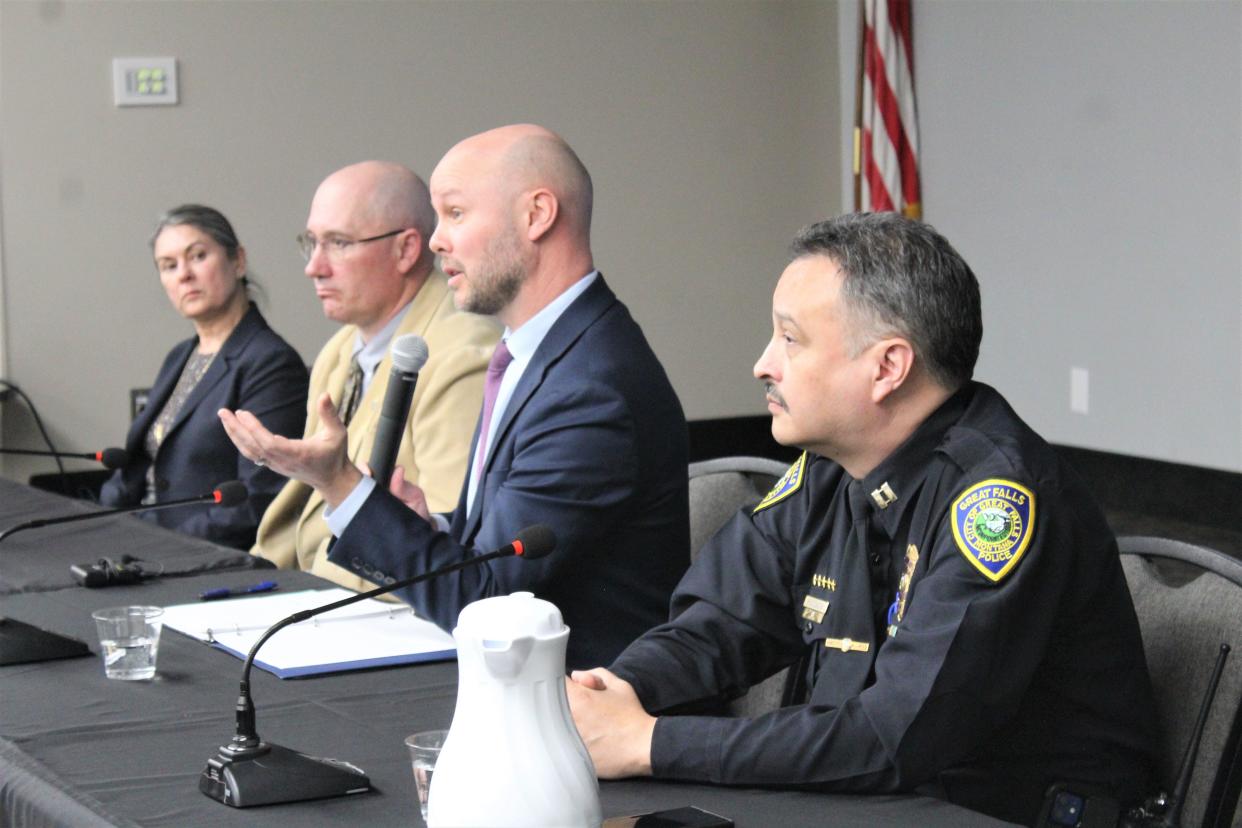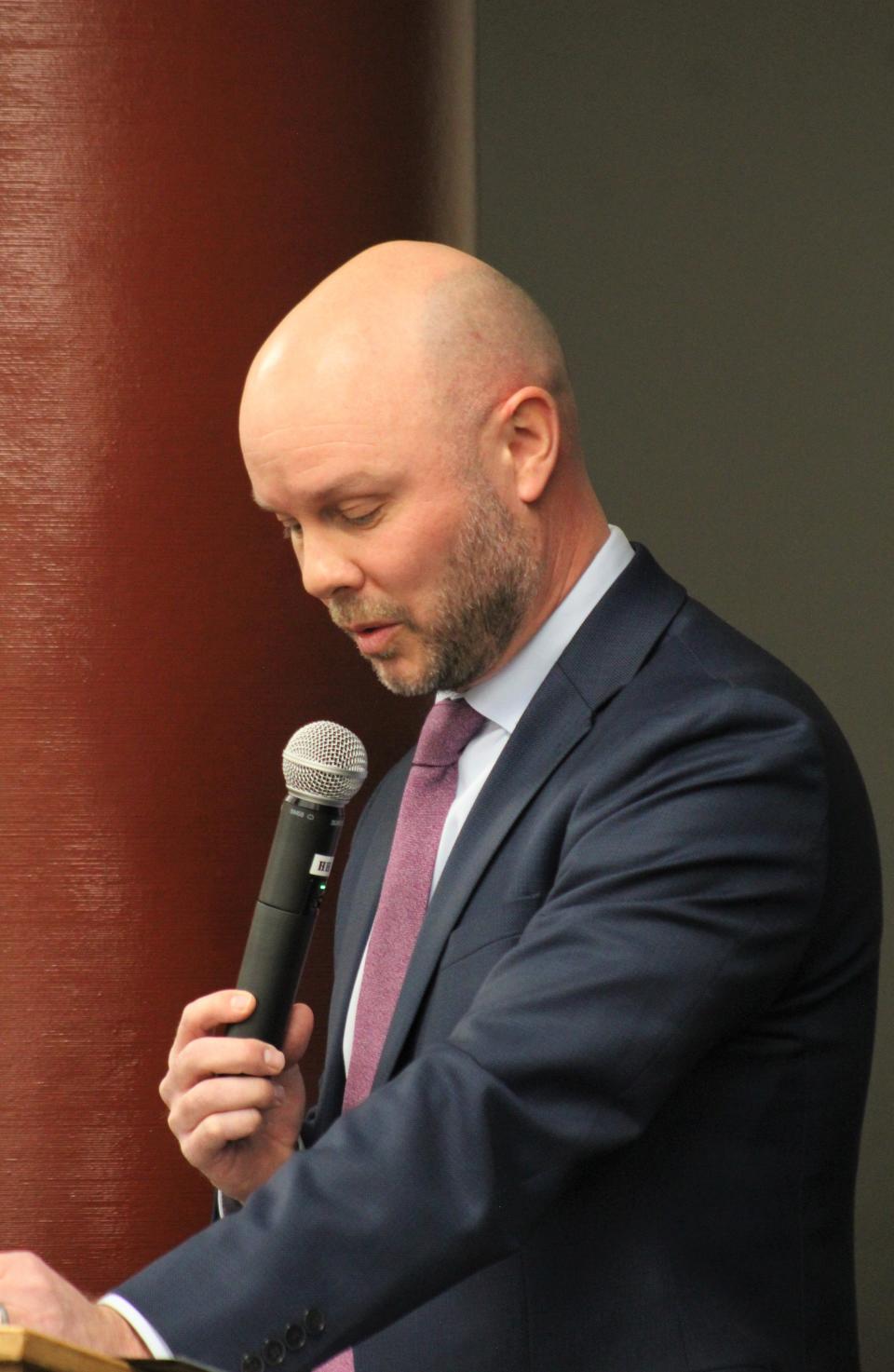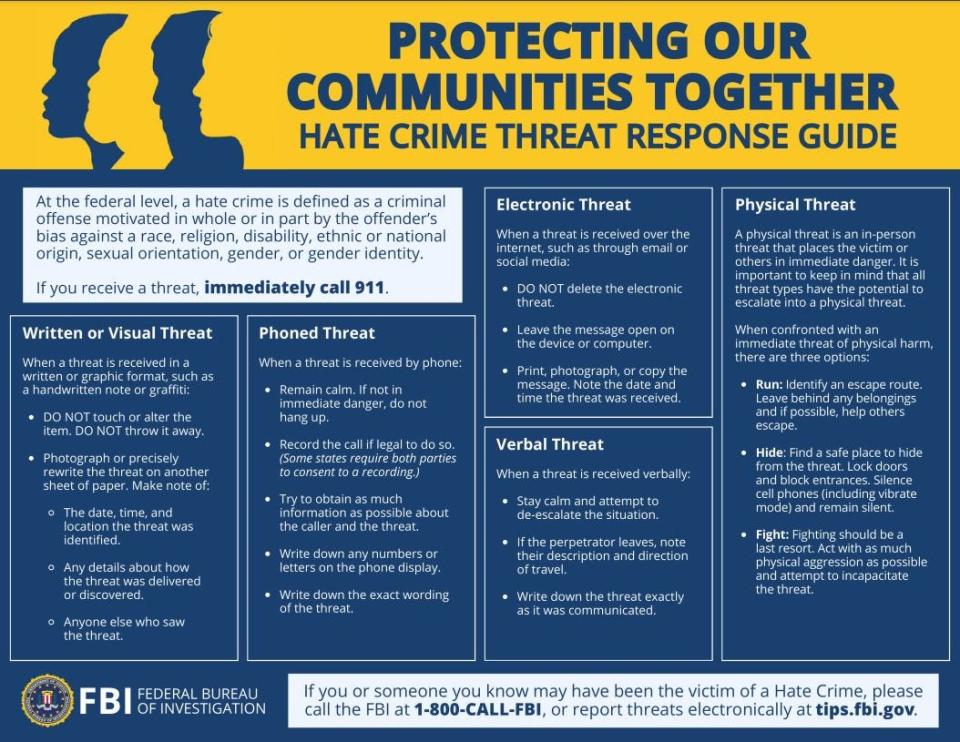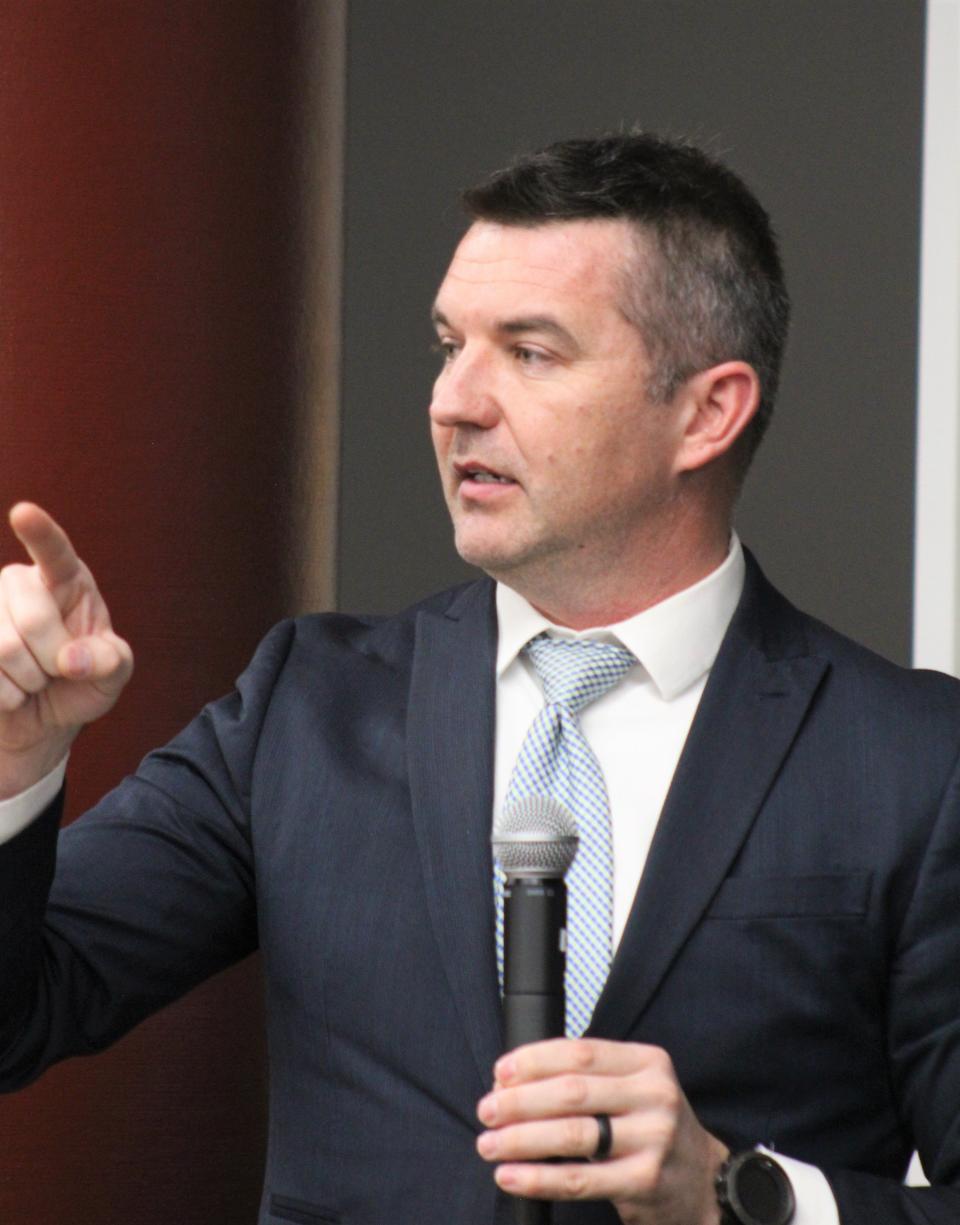Hate crimes a rising concern in Great Falls and around the state

In early January 2024 the Great Falls Public Library discovered anti-Semitic, neo-Nazi stickers had been inserted into at least 16 books. At the same time a video surfaced on at hate group internet chat site that showed the racist literature being placed in the books at the Great Falls Public Library.
It was only the most recent in a string of racist propaganda which infiltrated Great Falls in recent months, including anti-Semitic stickers placed in public spaces around this community, leaflets left on vehicle windshields, and sandwich bags filled with popcorn and scripts of racial slurs thrown onto neighborhood lawns and doorsteps.
The lasting effect of these attempts at racial propaganda might be small, but is an increasing trend which prompted the Great Falls Public Library to launch its “Hate Has No Home Here’ campaign.
On Tuesday a panel of federal, state and local law enforcement came to the Great Falls library to speak to their coordinated efforts to arrest and prosecute those who engage in acts of violence and hate-based propaganda.
“We are here as part of a United Against Hate campaign that the U.S. Department of Justice is requiring all U.S. Attorney’s Offices throughout the country to conduct,” said Jesse Laslovich, U.S. Attorney for the District of Montana. “We’ve seen far too often how individuals filled with hate have unleashed horrific violence. While thankfully we haven’t seen that yet thus far … we’re not immune to the realities of hate-based violence here in Montana.”
Laslovich pointed out several hate crime cases the U.S. Attorney’s Office has prosecuted in Montana in recent months. They include the successful prosecution of a Montana man in June 2023 who was sentenced to 18 months in prison for firing an AK-style rifle into the home of a lesbian couple, and then walked further into the town of Basin in Jefferson County with the expressed intention of targeting others he perceived to be lesbian, queer or gay.
“The defendant (John Howland) made it his mission to rid the town of Basin, Montana, of its lesbian and gay community,” a Department of Justice report states. “Armed with a rifle and other weapons, he approached the house of a woman that he knew identified as lesbian, firing several rounds into the property. The woman was home, but not hit.”
“Assuming the first victim was dead, the defendant approached other homes of people known locally to be gay or lesbian,” the Justice Office report continues. “He shot several more rounds at people in the vicinity before fleeing when law enforcement arrived. He was arrested the next day.”

Another case involved a Helena man who pled guilty to possessing homemade bombs and a silencer after being accused of attempting to attack a Helena high school in a “Columbine-style” massacre.
“The Helena Police Department received information from an individual that Logan Pallister, 25, possessed multiple bombs, had access to multiple firearms and had been making threats of committing an attack at a local high school,” the Department of Justice news release states.
“On May 31, 2022, at about 4 a.m., police officers arrested Pallister as he was walking toward his car from his residence, wearing a black trench coat and carrying a bag. During a search of Pallister, officers found eight firearms that were concealed on his person.”
Laslovich noted that hate crimes are significantly underreported across the United States, but that an FBI report on crimes reported in 2022 concludes that hate related crime is on the rise.
“Hate crimes based on sexual orientation recorded their highest totals in the last five years and increased by 10% over the year 2021,” Laslovich said. “An increase of nearly 40% was observed in reported anti-transgender incidents compared to just the year previous.”
Of considerable concern is the occurrence of anti-Semitic assaults. Referencing FBI reports Laslovich said hate crimes against Jews had risen by 25% after 2021, and that the Anti-Defamation League reported that 2022 was the worst year for the report of hate incidents in its more than century long history.
“Anti-Semitic hate crimes rose 25% over 2021, with those crimes accounting for half of all religion-based hate," Laslovich said. “After what Hamas did in Israel on Oct. 7, these numbers have only gotten worse. We’ve seen a 337% increase over 2022. It appears that some of our college campuses have become vectors for antisemitism and we’re not immune to that.”
He noted that the U.S. Department of Education recently launched an investigation into allegations that Montana State University staff failed to act on multiple reports that racist and sexually violent messages and death threats had been transmitted to at least 20 students at MSU. Montana State University has also experienced a proliferation of anti-Semitic literature across its campus.

However, the question remains what can be done about it. The conflict between what is hate and what is free speech is a fundamental concept when considering the prosecution of hate crimes.
“The crime has to be motivated by hate, and that can a big distinction,” Cascade County Attorney Josh Racki said. “If a guy spills a drink on another guy at a bar and they start screaming at each other and get into a fight where they use racial epithets, that doesn’t necessarily make it a hate crime. Defendants say off-color things when they’re angry or doing something, even when it’s not really motivated by hate. They’re just jerks who wanted to rip this guy off for drugs and they call them names. You have to make sure that it’s a motivation of hate."
Montana had 14 reports of hate crimes in the state during 2023, five of which were in Great Falls. GFPD Investigative Services Bureau Captain Rob Moccasin said the local police department works closely with state and federal officials to investigate allegations of hate crimes.
“What typically happens is that a citizen has been a victim of a certain type of crime, but if they see a threat online, we take those pretty seriously,” Moccasin said. “If you let us know those, we’re looking at those promptly trying to figure out if that threat is an actual true threat.”
All the members of Tuesday’s panel emphasized the importance of reporting any potential hate crime as quickly as possible.
“Even if it is not a hate crime, reporting is critical,” said Assistant U.S. Attorney Ryan Weldon. “When we look into a defendant and we’re starting to try and prove the activities they’ve committed, one of the things we look at is their past criminal history. That’s why reporting it to local law enforcement and to the FBI is critical.
“The exception to free speech is when it becomes a true threat,” Weldon added. “Individuals have the ability to speak their mind and that is protected under the First Amendment, but if something ventures into the land of a true threat then that can become criminal activity.
“The things to consider with a true threat are, it’s a serious communication of an intent to commit an act of unlawful violence against a particular individual or group of individuals. That is not protected activity.”

Weldon presented a few examples of what separates what free speech what is classified as illegal hate speech.
“If you are walking through a public park and you see a white supremacist rally and you hear ‘our race is superior to other races’ … that would be protected speech,” he explained. “The reason is there’s no inciting language to take violent action against another specific individual.”
An alternative situation would be a public speaker stating “those opposing our race, like those people over there, are the enemy and must be attacked now.” That, according to Weldon, is not protected under the U.S. Constitution.
“Now we’re in the realm of a true threat, and the reason for that … there is a statement of violence toward other individuals who are right there,” Weldon said. “Under the true threat analysis that would not be protected activity. That would be something that could be prosecuted.”
“If there is a hate crime, or you’re concerned that there may be a hate crime occurring … call 911 immediately,” Weldon added. “Local law enforcement, the FBI and all our offices all work together. We want that information reported immediately. There is also a website for the FBI which is www.fbi.gov but the initial reporting should be made to local law enforcement and then the agencies can work together.”
Laslovich emphasized law enforcement's dedication to seeing hate crime violence prosecuted toward conviction.
“One thing that just pains me when I see the reasons why people don’t report hate crimes is because they don’t think law enforcement cares,” he said. “These people are turning over every rock to find and try to hold someone accountable, whether it’s a hate crime or not.
“We get wrapped up in this national conversation and I’m just telling you that law enforcement, local, state, and federal are all moving mountains to hold people accountable. Sometimes we just can’t get there. Sometimes we can’t prove it, but its’ not because we don’t care.”
This article originally appeared on Great Falls Tribune: Law enforcement speaks about hate crime in Montana and Great Falls

